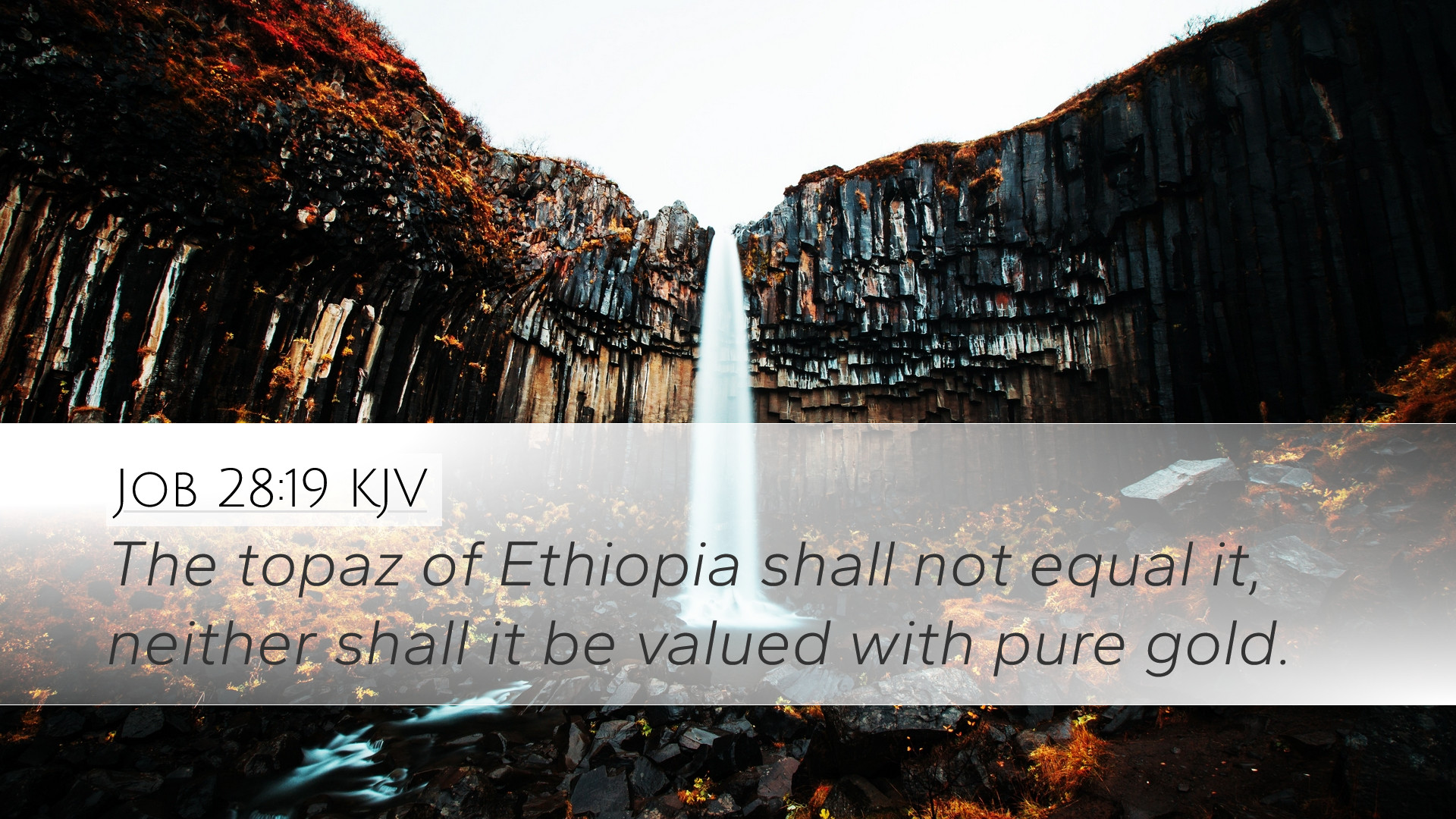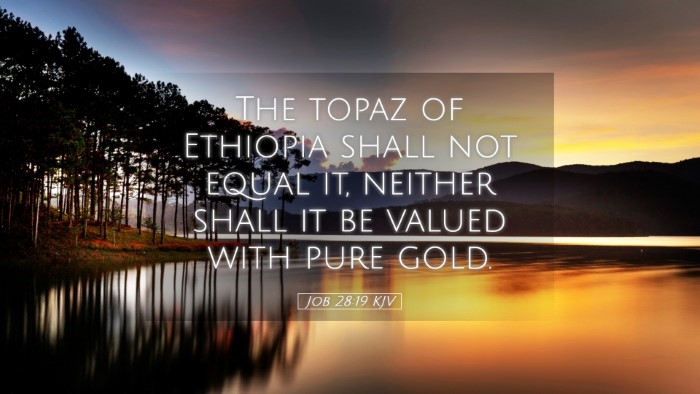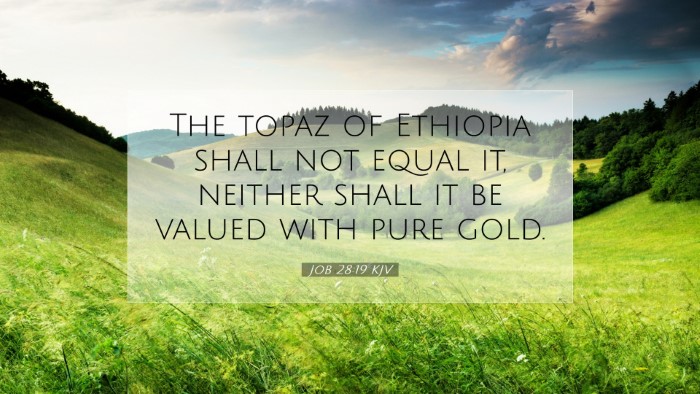Old Testament
Genesis Exodus Leviticus Numbers Deuteronomy Joshua Judges Ruth 1 Samuel 2 Samuel 1 Kings 2 Kings 1 Chronicles 2 Chronicles Ezra Nehemiah Esther Job Psalms Proverbs Ecclesiastes Song of Solomon Isaiah Jeremiah Lamentations Ezekiel Daniel Hosea Joel Amos Obadiah Jonah Micah Nahum Habakkuk Zephaniah Haggai Zechariah MalachiJob 28:19
Job 28:19 KJV
The topaz of Ethiopia shall not equal it, neither shall it be valued with pure gold.
Job 28:19 Bible Commentary
Commentary on Job 28:19
Verse: “The topaz of Cush cannot equal it; Nor can it be valued in pure gold.” (Job 28:19, NKJV)
Introduction
Job 28:19 emerges from one of the most profound discourses on wisdom found in the Book of Job. Here, Job reflects on the inestimable value of wisdom—portraying it as a treasure beyond physical riches. This commentary aims to distill insights from public domain commentaries, such as those by Matthew Henry, Albert Barnes, and Adam Clarke, to provide a rich understanding of this verse for pastors, students, and theologians.
Context of Job 28
In this chapter, Job presents a poetic meditation on the search for wisdom. As he employs vivid imagery of mining for precious metals, he contrasts the material wealth sought by mankind with the spiritual treasure he believes is wisdom. Throughout this discourse, Job emphasizes that wisdom cannot be acquired through human endeavor but is a divine endowment.
Insights from Commentaries
Matthew Henry’s Commentary
Matthew Henry eloquently illustrates that the worth of wisdom greatly exceeds the value of earthly treasures. He posits that the "topaz of Cush"—a stone celebrated for its beauty—stands as a metaphor for all earthly treasures that pale in comparison to wisdom. Henry emphasizes that wisdom, understood as a fear of the Lord and a deep reverence of His ways, is inherently valuable, providing both guidance and understanding that no amount of material wealth can procure.
Albert Barnes’ Commentary
Albert Barnes elaborates on how the comparison of wisdom to the topaz of Cush serves as a reminder of the futility of seeking wisdom in the physical realm. Barnes points out that while the topaz may be precious, it ultimately lacks the intrinsic value of divine wisdom. He notes that wisdom is a gift from God, and, unlike gems or gold, it offers eternal benefits, shaping one's moral character and guiding one’s life in accordance with divine principles.
Adam Clarke’s Commentary
Adam Clarke provides a historical and linguistic analysis of the "topaz of Cush," suggesting its association with the wealth of kingdoms. Clarke argues that Job is illustrating a transcendent lesson with this verse—the insignificance of earthly treasures when compared to the profound insight and understanding that wisdom provides. He emphasizes that the pursuit of wisdom should transcend temporal matters, leading one to seek a relationship with God, which is the true source of wisdom.
Theological Significance
This verse, set in the broader theological narrative of Job, underscores the understanding that wisdom is a divine gift. It poses a significant challenge to those who prioritize material wealth over spiritual insight. The collective insights emphasize that wisdom is not merely knowledge, but the application of that knowledge in accordance with God’s will. Thus, pastors and theologians are reminded of their role in guiding congregants toward a pursuit of wisdom that aligns with God’s purposes.
Practical Applications
- Pursuit of Wisdom: Believers are encouraged to actively seek wisdom through prayer, study of scripture, and community fellowship, understanding that it will yield greater riches than any material possessions.
- Teaching on Values: Pastors can utilize this verse to instruct congregations about the disparity between earthly treasures and heavenly wisdom, urging them to focus on eternal rather than temporal values.
- Wisdom in Decision Making: Students and scholars are prompted to consider how wisdom influences life choices, recognizing that valuing divine insights leads to a fulfilling and righteous life.
Conclusion
Job 28:19 serves as a poignant reminder of the eternal value of wisdom in the life of the believer. By drawing from the insights of venerable commentators like Henry, Barnes, and Clarke, we gain a deeper appreciation for wisdom's worth that transcends the fleeting nature of material wealth. This verse challenges us to elevate our pursuit of spiritual understanding above all else, recognizing that true wisdom is rooted in divine revelation and leads to everlasting life.


